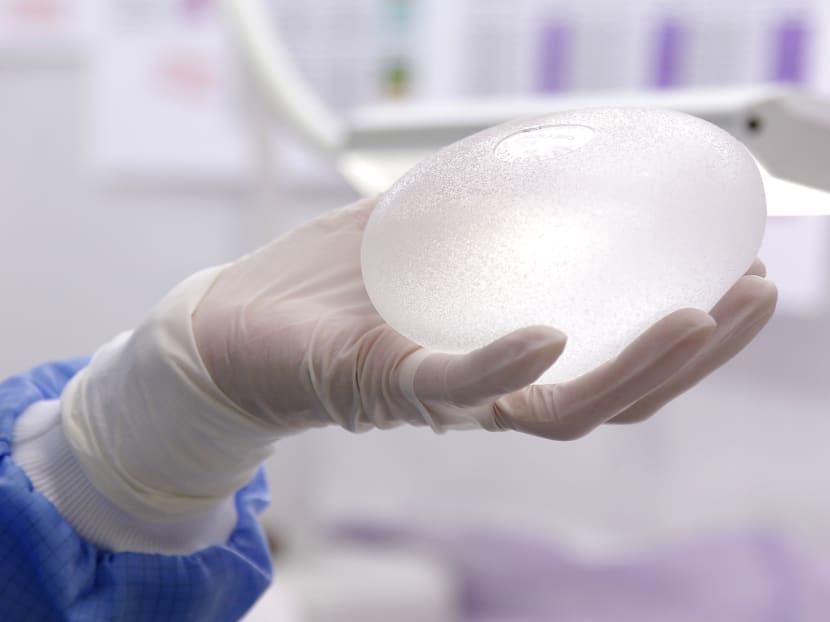Caution urged over breast implant use after S’pore sees first case of implant-linked cancer
SINGAPORE — Health authorities here are advising people who have undergone breast enlargement to consult their doctors if they suffer pain or swelling around their silicone implants.
SINGAPORE — Health authorities here have disallowed the use of one particular breast implant product after a person in Singapore was diagnosed with a rare form of cancer associated with breast implants.
The Health Sciences Authority (HSA) advises people who have undergone breast enlargement to consult their doctors if they suffer pain or swelling around their silicone implants.
In a media statement on Friday (May 10), the authority said more information has recently come to light about the risk of the cancer, of the immune system, that develops around breast implants.
It also said that Singapore had seen its first diagnosis of the cancer type, called breast implant-associated anaplastic large cell lymphoma (BIA-ALCL). The patient, who was diagnosed early, is recovering, it added.
“HSA received the local case of BIA-ALCL in March 2019. The patient was implanted with the Allergan Natrelle breast implants and was diagnosed with BIA-ALCL two years post-implantation,” it said.
“Breast implants registered in Singapore have a silicone outer surface that is either smooth or textured. Global reports have indicated increased incidence of BIA-ALCL with the use of ‘macro-textured’ breast implants.
“Allergan Natrelle breast implant is the only brand of ‘macro-textured’ breast implant that is registered here. As a precautionary measure, HSA has disallowed the sale of the Allergan Natrelle breast implant in Singapore since April 2019,’’ the HSA said.
Patients with textured implants face higher risks of contracting the lymphoma than people with smooth-surfaced implants, it said. Macro-textured implants carried the highest risk.
There are seven other choices of smooth and textured implants available for sale here.
The HSA urged anyone considering getting an implant to discuss the risks with their doctors, whether the implant is for reconstruction or augmentation purposes.
Friday’s announcement came some three months after the HSA convened an expert panel comprising healthcare professionals from both public and private hospitals to assess mitigation measures required given growing concerns over BIA-ALCL globally.
The United States Food and Drug Administration revealed in February that at least 457 people had developed the disease as of last September, and nine of them had since died. Canada and France were the first countries to suspend sales of certain textured breast implants.
Evaluating available data, Singapore’s expert panel found that risks factors associated with the disease “are still unclear” and its mortality rates remain low, the HSA said. The cancer was rare.
It cited an estimate of about 800 reports of BIA-ALCL globally after 10 to 35 million breast implants had been put in worldwide.
The expert panel said while regulatory agencies are actively investigating the risk of BIA-ALCL, “timely detection and appropriate clinical management remain the key factors in managing BIA-ALCL effectively”.
Should people now remove their breast implants to ward off any risks?
As BIA-ALCL occurrences remain “rare”, Professor Ong Yee Siang – Singapore General Hospital’s head and senior consultant of plastic, reconstructive and aesthetic surgery and a member of the expert panel – said it is “not necessary”, unless symptoms of swelling, lumps or pain around the implant are present.
In the worst case scenario, if a patient develops the cancer, HSA said it can be successfully treated with surgery if diagnosed early. And in cases where the cancer has spread to other parts of the body, patients had undergone further treatment such as radiation, chemotherapy and targeted immunotherapy, it said.
Scientific research on BIA-ALCL emerged as early as in 2017, with two reports estimating that the incidence rates of the disease in people who chose textured implants as one in 3,817 and one in 30,000 respectively.
That year, HSA required manufacturers of breast implants to include cautionary statements regarding the risks of BIA-ALCL in the package inserts of breast implants registered here. It then also informed relevant healthcare professionals of BIA-ALCL and its possible association with textured implants, and told them to report any cases to HSA.









